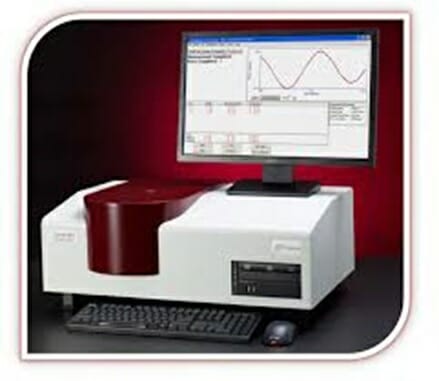TestaAnalytical Solutions e.K reports that its Nanobrook ZetaPALS zeta potentialanalyser is uniquely optimised to make sensitive and precise measurements inboth organic and aqueous media.
Typically making zeta potential measurements in organic (non polar) solventsrequires much higher sensitivity than in aqueous (polar) solutions. TheNanobrook ZetaPALS analyser achieves this using phase analysis light scattering(PALS). Using proprietary PALS technology, the Nanobrook ZetaPALS can be usedto make zeta potential measurements up to 1,000 times more sensitive thantraditional light scattering methods based on the shifted frequency spectrum.
Made of PEEK with a Palladium (Pd) electrode assembly – the NanobrookZetaPALS measurement cell is resistant to the widest range possible ofsolvents, and offers excellent chemical stability, easy cleaning and long-termtop performance. Precision Peltier temperature control enables precise zetapotential measurements from -5 °C to 110 °C. For laboratories tasked with justanalysing aqueous solutions inexpensive disposable plastic cells can be usedwith the high performance electrode assembly. For applications in organicsolvents, quartz cells are available.
Made
of PEEK with a Palladium (Pd) electrode assembly – the Nanobrook ZetaPALS
measurement cell is resistant to the widest range possible of solvents, and
offers excellent chemical stability, easy cleaning and long-term top
performance. Precision Peltier temperature control enables precise zeta
potential measurements from -5 °C to 110 °C. For laboratories tasked with just
analysing aqueous solutions inexpensive disposable plastic cells can be used
with the high performance electrode assembly. For applications in organic
solvents, quartz cells are available.
Almost all particulate or macroscopic materials in contact with a liquid
acquire an electronic charge on their surfaces. Zeta potential is an important
and useful indicator of this charge which can be used to predict and control
the stability of colloidal suspensions or emulsions, for example. The greater
the zeta potential the more likely the suspension is to be stable because the
charged particles repel one another and thus overcome the natural tendency to
aggregate. The measurement of zeta potential is often the key to understanding
dispersion and aggregation processes in applications as diverse as water
purification, ceramic slip casting and the formulation of paints, inks and
cosmetics.
For further information on using a Nanobrook ZetaPALS analyser to zeta
potential measurement in both organic and aqueous media please visit https://testa-analytical.com/?dc=Zeta
or contact Testa Analytical Solutions on +49-30-864-24076 / info@testa-analytical.com.
Testa Analytical Solutions e.K. is a company dedicated to supplying the best
possible instrumental solutions for characterization of polymers, particles,
nanomaterials and proteins. Drawing upon over 30 years’ experience of
technologies serving these markets, the staff at Testa Analytical are happy to
share their knowledge with researchers worldwide to help provide them with a
working solution for even the most demanding applications.







